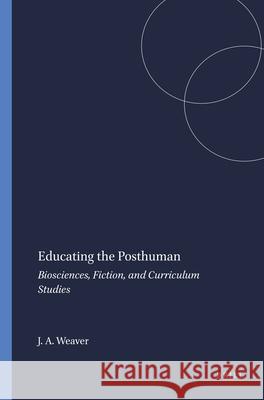Educating the Posthuman : Biosciences, Fiction, and Curriculum Studies » książka
Educating the Posthuman : Biosciences, Fiction, and Curriculum Studies
ISBN-13: 9789460910937 / Angielski / Miękka / 2010 / 134 str.
Educating the Posthuman : Biosciences, Fiction, and Curriculum Studies
ISBN-13: 9789460910937 / Angielski / Miękka / 2010 / 134 str.
(netto: 133,55 VAT: 5%)
Najniższa cena z 30 dni: 132,66
ok. 22 dni roboczych.
Darmowa dostawa!
Educating the Posthuman is an exciting and refreshing book. Bravo! This book is unique and unusual. Weaver explores the intersections between literature, biosciences and curriculum theory. Understanding the posthuman best happens when scholars explore these three interrelated areas of study. From Frankenstein to Einstein, Weaver creates a fascinating text that all educators, literary scholars and scientists should read. From the problematics of pharmaceuticals to the promise of scholarly debate, this text dazzles. Weaver argues that the scientific issues of our day are best understood through the study of fiction. What does fiction teach that science does not? Are scientists blind to their own conundrums? Certainly colleges of education and public schools-Weaver claims-are bottomless conundrums. One of the most troubling and fascinating claims that Weaver makes is that curriculum scholars should leave colleges of education and find their homes elsewhere. Colleges of education-at least in the United States-have become unthinking, rule-bound, accrediting nightmares. Weaver says that colleges of education as well as public schools are worse than nightmares because at least at the end of a nightmare we wake up. But now, in colleges of education and in public schools, the nightmare goes on and on without reprieve. Clearly educating (the posthuman) is not happening in either colleges of education or public schools. What is happening is that professors of education and teachers as well as students are being miseducated to think that all that matters are instrumental outcomes and getting a paycheck. As if education has anything to do with getting a paycheck!! Weaver weaves these disturbing and exciting thoughts together in a most imaginative way. This book is a must read for students, teachers, professors and everyone who grapples with what is post about the human.Marla MorrisAssociate Professor of EducationGeorgia Southern UniversityThe notion that Colleges of Education and public education train their students to chase monsters is nothing new. The fact that these monsters are the power of a liberal arts education, democratic thinking in the Deweyan sense, and dreams of public service and public good tells us that things are horribly wrong. Drugged physically, morally and intellectually schools are producing sharp self-medicators who function in our society based on their lessons learned. The life of the mind has been replaced by the desolate future we see in the Terminator movies. At one time the liberal arts and physical sciences were housed in the same units. Colleges of education also once followed such a model. Now we find the liberal arts reeling and their influence on our thought diminished. John Weavers idea of curriculum studies following the liberal arts is not one to be discarded lightly. There is no room in colleges of education for the undrugged mind to find a home. When preservice and inservice students tell me they used to like to read, then I know were doing the same thing to our own literacy identities that we are doing to children.











